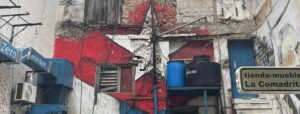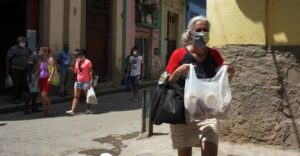By Clay Boggs and Geoff Thale
Pope Benedict XVI concluded yesterday his three-day visit to Havana, the first papal visit since Pope John Paul II traveled to the island in 1998. While in Cuba, the Pope was received by President Raúl Castro. He also met with Fidel Castro, said Mass in Havana’s Revolution Plaza, and delivered farewell remarks before leaving the island. A cursory reading of news headlines illustrates the diversity of interpretations of the visit. Indeed, it is difficult to know exactly what to make of the Pope’s measured and sometimes vague public statements in Cuba.
In many ways, this visit exemplified the Catholic Church’s gradualistic and diplomatic approach to engaging with the Cuban government. We don’t know what was said in private discussions between the Pope and the Castros. But to the disappointment of many, including the U.S. government, the Pope did not publicly ask the Cubans to release Alan Gross, a USAID contractor imprisoned in 2009 for distributing satellite and communications equipment in Cuba. He did not call for the end of Communism (although he did state that Marxism “no longer responded to reality”). Instead, it seems that the Pope requested that religious instruction be allowed in schools, that the Church have greater access to media, and that Good Friday be made a state holiday, as Christmas was in 1998, making requests that were in the direct interests of the Church. Like the Cuban government itself, the Catholic Church seems committed to pursuing broad changes in Cuba “sin prisa pero sin pausa” (slowly but relentlessly).
The Pope’s visit also underscored the Church’s commitment to dialogue. As the Pope said, “possible discrepancies and difficulties will be resolved by tirelessly seeking what unites everyone, with patient and sincere dialogue, and a willingness to listen and accept goals which will bring new hope.” It is true that the Cuban government seemed to bristle at statements by the Pope that were widely interpreted as calls for greater political openness: Marino Murillo, the country’s economic reforms czar, stated flatly that “there will be no political reform.” We should be careful, though, not to read too much into this statement. The reality is that while there are no indications that Cuba is moving toward a multi-party system, the government’s painstaking efforts to make sure the public was consulted in designing the current economic reforms is evidence of a changing political sensibility among Cuba’s leaders. Moreover, the Cuban government was generally respectful of the Pope and willing to engage in dialogue. Foreign Minister Bruno Rodriguez responded to the Pope’s criticisms of Marxism gracefully, stating that “Cuba will listen with all respect to His Holiness.” And, most importantly, both sides kept talking.
Yet many wonder what the Pope’s visit will mean for human rights in Cuba. Only days before the Pope arrived, the Cuban government briefly detained several dozen members of the Ladies in White. These short-term detentions had the apparent goal of dissuading protest during the Pope’s visit. When a protester shouted anti-government slogans before the Pope’s Santiago Mass, the person was forcibly removed, presumably by state agents. The Cuban government’s response serves as a reminder of its shortcomings on freedom of expression and freedom of assembly. The Church did not pursue a confrontative approach on these issues, though Pope Benedict called for the expansion of freedoms, especially religious freedom, and opposed limitations on “fundamental liberties.” It is clear that the Church has adopted a measured, constructive approach to how it advances the discussion.
It seems that this visit was focused on consolidating the Church’s much-improved relationship with the government. But while improved relations are in the interest of both the Catholic Church and the Cuban government, it is also clear that the Church would like to see political reform on the island. We may not see immediate actions on human rights in Cuba, but this visit has strengthened the Catholic Church’s ability to open space for dialogue and debate; the church’s role in negotiating the release of political prisoners is strong evidence that this is the right approach to addressing the human rights situation in Cuba.
We can only hope that the U.S. government will take notice of the Church’s success in promoting reform through patient and respectful dialogue. It is certainly true that the Obama administration has played an important role in this process by allowing more religious exchanges between Cuba and the United States. These exchanges strengthen the religious community in Cuba and build bridges between the two societies. But in many respects, U.S. diplomacy towards Cuba largely consists of a series of preconditions to dialogue (the freedom of Alan Gross is only the most recent ultimatum that the United States has delivered to Cuba). As a result, the ability of the U.S. government to promote change on the island remains very limited; the Pope’s visit serves as a reminder that engagement is the best way to promote human rights in Cuba.
(To read WOLA's three-part background series on the history and current state of religion in Cuba, click here).
_______________________________________________________________________________________
Clay Boggs is WOLA’s Program Assistant for Cuba and for Rights and Development. He recently visited Cuba on a research trip.
Geoff Thale is WOLA’s Program Director. Mr. Thale has followed issues of religious freedom in Cuba since the time of Pope John Paul II’s visit in 1998—conducting research, bringing Cuban religious leaders and scholars to the United States on a number of occasions, organizing public events on church-state relations in Cuba, and participating in a delegation of religious leaders to Cuba. More recently, Mr. Thale met with officials of the Catholic, Protestant, and Jewish communities in Cuba to discuss the Pope’s trip.
(Photo by Sergey Gabdurakhmanov).


